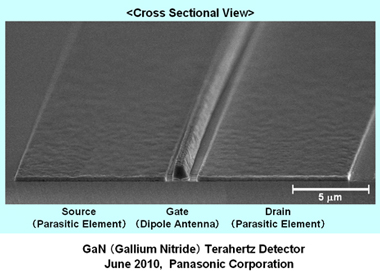
| Home | About Us | Contribute | Bookstore | Advertising | Subscribe for Free NOW! |
| News Archive | Features | Events | Recruitment | Directory |
News
23 June 2010
Panasonic develops GaN-based detector for compact terahertz systems
At the 68th Device Research Conference (DRC) at the University of Notre Dame in South Bend, IN, USA this week (21–23 June), Panasonic Corp of Osaka, Japan presented R&D results for a terahertz (THz) detector that uses a gallium nitride (GaN) transistor to achieve what is claimed to be record sensitivity at room temperature. The GaN-based THz detector is applicable to a variety of security or analyzing systems, which the firm reckons should drive the wide-spread use of such THz applications in the future.

The GaN detector forms a plasma wave of electrons, in which the electron density fluctuates as a wave. This plasma wave resonates with the incident THz wave, which is detected as an electric signal at the GaN transistor. The high electron velocity in GaN effectively increases the amplitude of the plasma wave and hence the extracted electric signal.
The detector uses the gate electrode itself as a dipole antenna free from the loss in the transmission lines. In addition, the GaN transistor’s source and drain electrodes are designed to work as parasitic elements for the antenna, effectively confining the incident THz wave in the vicinity of the gate. Also, the metal-oxide-semiconductor (MOS) gate structure that is used reduces the gate leakage current, suppressing the leakage of the plasma wave around the gate antenna. The choice of the material, together with the novel antenna structure, successfully increases the sensitivity of the THz detector.
Fabricated using Panasonic’s proprietary GaN technologies, the THz detector achieves very high sensitivity of 1100V/W at room temperature, while a conventional detector using thermal conversion requires cooling of the device to –270°C to maintain sufficient sensitivity. Being free from such cooling systems, the GaN-based THz detector enables THz systems to be very compact while maintaining high sensitivity.
Applications have been filed for nine domestic patents and one overseas patent on the technology.
![]() Search: Panasonic GaN THz detector
Search: Panasonic GaN THz detector
Visit: http://panasonic.net